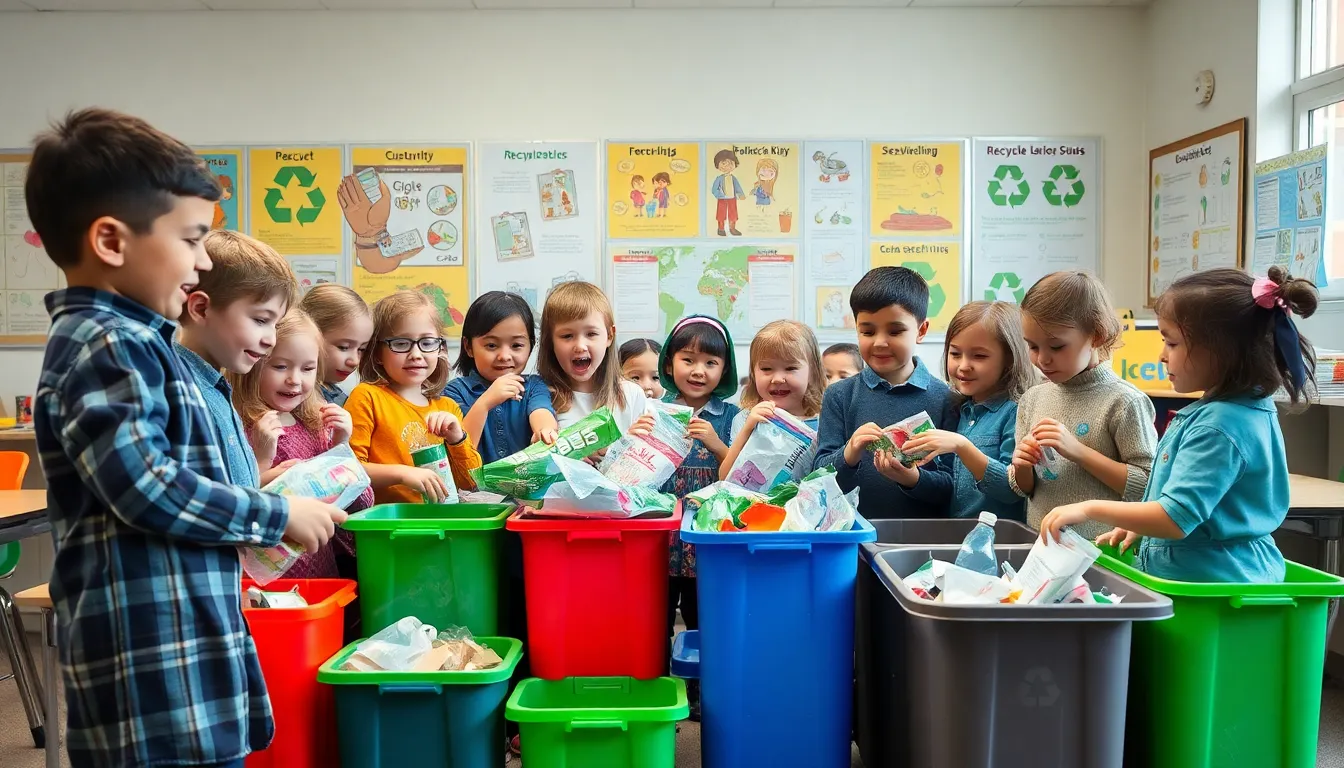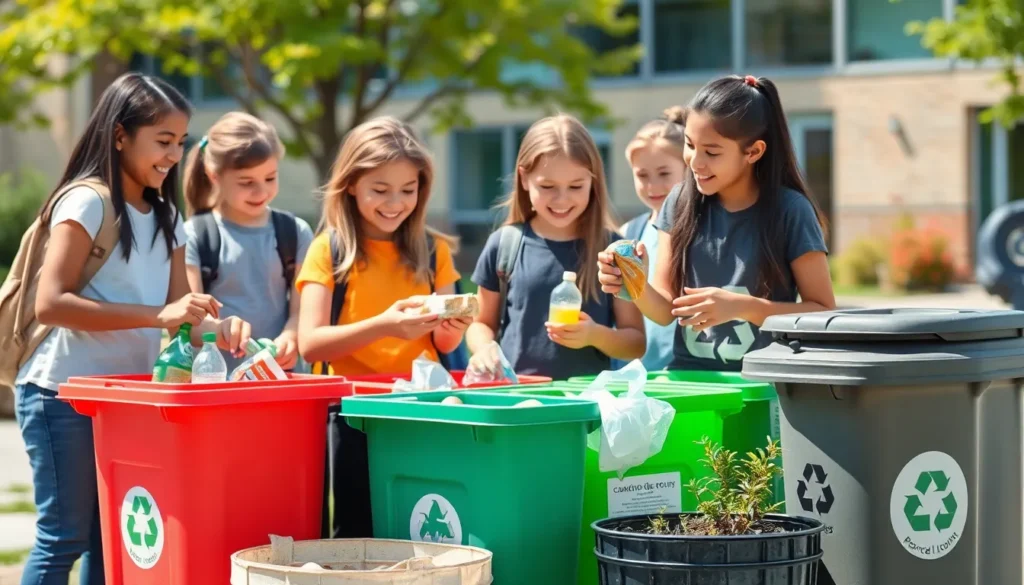Table of Contents
ToggleIn today’s world, schools are more than just places for learning; they’re also battlegrounds in the fight against waste. With lunch trays piled high and paper flying around like confetti, it’s time to tackle the trash that’s piling up. But fear not! Innovative waste management solutions are here to save the day, transforming schools into eco-friendly heroes one lunch period at a time.
Overview of School Waste Management Solutions
Schools face significant challenges in waste management, particularly during lunch periods. Effective solutions can help reduce waste output and promote sustainability. Implementing recycling programs allows students to sort their waste effectively, helping to divert materials like plastic and paper from landfills.
Composting initiatives serve to manage organic waste in a sustainable manner. These programs can educate students about the environmental benefits of composting while also producing valuable nutrient-rich soil for school gardens. Engaging students in these activities fosters a sense of responsibility toward waste reduction.
Infrastructure improvements, such as installing clearly marked bins for recyclables and compost, enhance waste management efforts. Ensuring proper signage increases student understanding of what materials go where. Regular monitoring of these bins can help maintain proper usage and encourage good habits.
Incorporating education into the waste management strategy enriches the overall effectiveness. Curriculum integration of waste management topics promotes environmental awareness among students. Workshops and practical demonstrations provide hands-on learning experiences.
Community involvement plays a key role in successful waste reduction initiatives. Collaborating with local businesses and organizations can offer resources and support. Partnerships can also help introduce innovative practices, such as zero-waste lunch initiatives, that challenge students to minimize their waste output.
Overall, schools can implement a range of innovative waste management solutions. Highlighting the importance of these strategies empowers students to become eco-conscious individuals. By embracing these practices, schools can transform their campuses into models of sustainability and environmental stewardship.
Importance of Effective Waste Management

Effective waste management plays a critical role in promoting sustainability in schools. Implementing strong waste management practices fosters a cleaner environment and sets a precedent for responsible behavior among students.
Environmental Benefits
Effective waste management reduces landfill contributions significantly. Recycling and composting initiatives contribute to lower greenhouse gas emissions, thereby improving air quality. Adopting eco-friendly practices within school systems supports habitat conservation, allowing biodiversity to thrive. Water quality benefits from reduced runoff pollution, enhancing the ecosystem’s health. School gardens flourish with compost, turning organic waste into valuable resources for learning and engagement.
Social Responsibility
Waste management signifies a school’s commitment to social responsibility. Students participate actively in reducing waste, fostering a sense of community pride. Educating young people about environmental issues encourages responsible citizenship and sustainable practices. Collaboration with local organizations strengthens community ties while providing additional resources for waste reduction initiatives. Schools transform into models of sustainability, inspiring others to adopt similar practices and promoting a culture of environmental stewardship among future generations.
Common Types of Waste in Schools
Schools encounter diverse types of waste, each requiring specific management strategies. Understanding these waste types helps schools implement effective solutions.
Organic Waste
Organic waste consists primarily of food scraps from lunch areas and kitchen operations. This type of waste contributes significantly to landfill mass. Schools can address this by promoting composting programs, allowing students to convert organic materials into nutrient-rich soil. Effective management of organic waste minimizes overall landfill contributions, benefiting both the environment and school gardens. Additionally, educational initiatives can teach students about composting benefits, further enhancing their understanding of sustainability.
Recyclable Materials
Recyclable materials in schools include paper, cardboard, plastics, and metals. These items often dominate the waste stream during school activities. Implementing recycling programs encourages students to actively participate in waste reduction efforts. Students can learn to sort materials properly, ensuring maximum recyclability. Bins labeled for different recyclable materials streamline the recycling process, making it easier for everyone to contribute. Engaging in these practices decreases the volume of waste sent to landfills and promotes a culture of recycling within the school community.
Innovative Waste Management Solutions
Schools play a vital role in introducing innovative waste management solutions. These strategies not only reduce waste but also promote sustainable practices among students.
Composting Programs
Composting programs effectively manage organic waste, primarily food scraps generated during lunchtime. Schools can set up specific compost stations, making it easy for students to drop off their organic waste. By implementing educational components, students learn about the decomposition process and the benefits of composting. Engagement grows as they contribute to producing nutrient-rich soil for school gardens. Schools can showcase garden-based learning initiatives, enhancing the cultivation of eco-conscious behavior. Various materials, like fruits, vegetables, and leftover milk, can be composted, significantly reducing landfill contributions.
Recycling Initiatives
Recycling initiatives provide a comprehensive framework for managing recyclable materials. Clearly marked bins for paper, cardboard, plastics, and metals simplify the sorting process for students. Active participation occurs when schools create awareness campaigns highlighting the importance of recycling. Frequent challenges and competitions can motivate students to adopt eco-friendly habits and reduce waste. Partnerships with local recycling facilities enhance the program’s effectiveness, ensuring that collected materials are processed correctly. Tracking recycling rates can also illustrate progress, fostering pride among students and staff in their waste reduction efforts.
Implementing a Waste Management Plan
Establishing a waste management plan in schools involves engaging the entire school community. Active participation from students and staff enhances awareness and accountability.
Engaging Students and Staff
Involvement is key. Students can take initiative by forming environmental clubs that promote waste awareness. Teachers might integrate waste management topics into their lessons, fostering a culture of sustainability. Workshops create opportunities for hands-on learning about recycling and composting. Competitions, like the “Waste-Free Lunch Challenge,” motivate participation and create excitement around waste reduction. Celebrating achievements through assemblies or newsletters encourages continuous engagement. Effective communication about the objectives and impacts of these initiatives ensures everyone understands their role.
Measuring Success
Using metrics to evaluate effectiveness is essential. Tracking waste volume can demonstrate the progress of reduction efforts. Surveys administered to students and staff can capture changes in attitudes and behaviors regarding waste management. Participation rates in recycling programs provide insight into community engagement levels. Collecting data from composting initiatives reveals organic waste reduction success. Analysis of this data will help refine the waste management strategy over time. Regular reporting on outcomes keeps everyone informed and accountable, reinforcing the commitment to sustainable practices.
Effective waste management in schools is essential for fostering a sustainable future. By implementing innovative solutions and engaging the entire school community, schools can significantly reduce their environmental impact. Through recycling programs composting initiatives and educational efforts students become active participants in creating a cleaner environment.
Collaboration with local organizations enhances these efforts providing valuable resources and support. As schools embrace these practices they not only contribute to waste reduction but also instill a sense of responsibility and pride in students.
Ultimately schools can transform into eco-friendly champions leading the way toward a more sustainable world for future generations.







